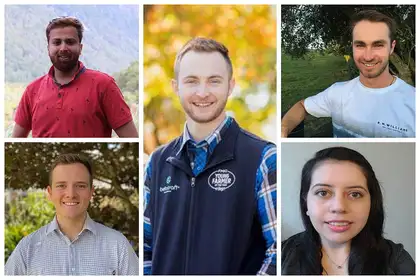
Varun Gododia (top left) James Robertson, William Robertson, Carolina Lozada and Zane Williams (bottom left).
New Zealand exports dominate on the world stage and so too has a team of Massey graduates putting their knowledge of food and agribusiness to the test, and gaining first place at the annual International Food and Agribusiness Management Association (IFAMA) case study competition.
Due to COVID-19 restrictions, the competition was held online on 22 June with competitors zooming in from around the world. The preliminary round saw 26 teams compete, including four from New Zealand, who were coordinated by FoodHQ.
From this round, 11 teams were chosen to compete in the final including one New Zealand team made up of Massey agribusiness scholars James Robertson, Zane Williams and William Robertson, Master of Agribusiness graduate Carolina Lozada and Master of Food Technology graduate Varun Gododia.
The team were given four hours to read and analyse a case study that focused on Perfect Day Foods – an American company producing the world’s first whey protein without using animal-based milk, and supplier to three major ice cream companies in the United States.
The milk protein is produced by adding a milk-making genetic blueprint from a cow to organisms called microflora. From there, flora is fed plant sugars from a yeast plant and then fermented into a milk protein.
Once the team had gained an understanding of this product and the firm, they had to create a 25 minute presentation proving they understood the case, the issues Perfect Day Foods faces, and recommendations to overcome them. The team were able to convince a panel of judges consisting of chief executives from agribusiness firms that they had the winning solution.
One of their coaches, Professor in Farm and Agribusiness Management Nicola Shadbolt, says although the product is made in a lab, the company still needs access to feedstock and agriculture-based inputs such as plant sugars, to feed the yeast plant.
“The team applied a lot of knowledge and skills attained from studying agribusiness and food technology with Massey, such as their understanding of the global food map, global dairy, and who the various players are, as well as knowing about markets that are not typical in New Zealand but are very relevant for what is happening in the world of agribusiness.”
She says they also learnt about various strategies applied across global food value chains resulting in a strong understanding of all of the players and how they interconnect.
“One of the keys to any agribusiness solution is understanding your supply base, such as knowing where the farming system will need to be and how it will need to connect. This is critical to you being successful. I watched the team as the judges asked them questions around this and all of them had a thorough and confident understanding of that connection from end consumer to farmers and farming systems and all of the players in between, helped by what we taught them in their courses.”
Professor Shadbolt says she and fellow coach Dr Elena Garnevska, have enabled Massey to have a longstanding history in this competition, and she was proud yet again to see graduates shine on a global stage.
“It is also encouraging to see the success they have achieved since graduating in their professional working lives, with two now working for New Zealand’s largest food exporter, one in agritech, one in global banking and another as an entrepreneur running his own start-up,” she adds.